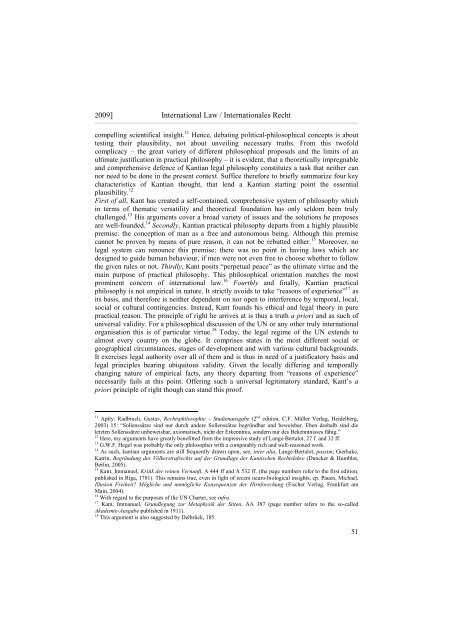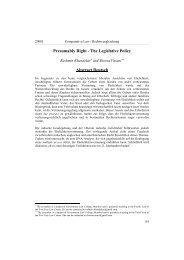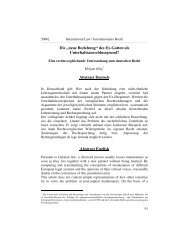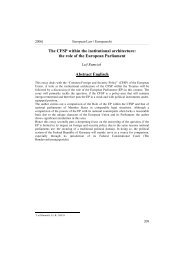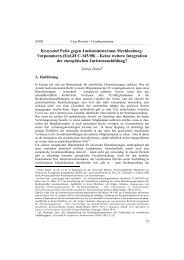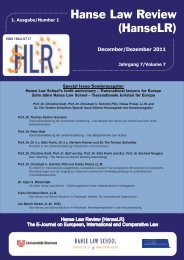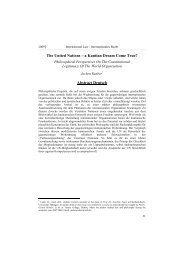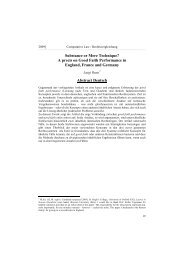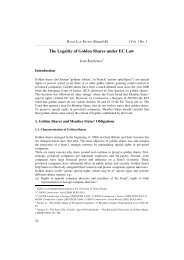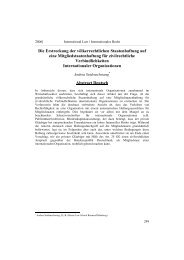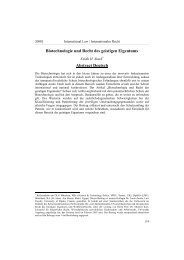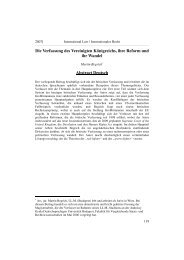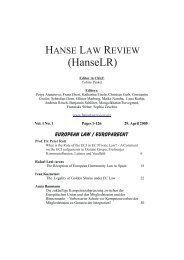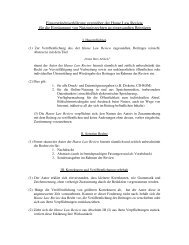The United Nations – a Kantian Dream Come True? - Hanse Law ...
The United Nations – a Kantian Dream Come True? - Hanse Law ...
The United Nations – a Kantian Dream Come True? - Hanse Law ...
Create successful ePaper yourself
Turn your PDF publications into a flip-book with our unique Google optimized e-Paper software.
2009] International <strong>Law</strong> / Internationales Recht<br />
___________________________________________________________________________________________________________________________________________________<br />
compelling scientifical insight. 11 Hence, debating political-philosophical concepts is about<br />
testing their plausibility, not about unveiling necessary truths. From this twofold<br />
complicacy <strong>–</strong> the great variety of different philosophical proposals and the limits of an<br />
ultimate justification in practical philosophy <strong>–</strong> it is evident, that a theoretically impregnable<br />
and comprehensive defence of <strong>Kantian</strong> legal philosophy constitutes a task that neither can<br />
nor need to be done in the present context. Suffice therefore to briefly summarize four key<br />
characteristics of <strong>Kantian</strong> thought, that lend a <strong>Kantian</strong> starting point the essential<br />
plausibility. 12<br />
First of all, Kant has created a self-contained, comprehensive system of philosophy which<br />
in terms of thematic versatility and theoretical foundation has only seldom been truly<br />
challenged. 13 His arguments cover a broad variety of issues and the solutions he proposes<br />
are well-founded. 14 Secondly, <strong>Kantian</strong> practical philosophy departs from a highly plausible<br />
premise: the conception of man as a free and autonomous being. Although this premise<br />
cannot be proven by means of pure reason, it can not be rebutted either. 15 Moreover, no<br />
legal system can renounce this premise: there was no point in having laws which are<br />
designed to guide human behaviour, if men were not even free to choose whether to follow<br />
the given rules or not. Thirdly, Kant posits “perpetual peace” as the ultimate virtue and the<br />
main purpose of practical philosophy. This philosophical orientation matches the most<br />
prominent concern of international law. 16 Fourthly and finally, <strong>Kantian</strong> practical<br />
philosophy is not empirical in nature. It strictly avoids to take “reasons of experience” 17 as<br />
its basis, and therefore is neither dependent on nor open to interference by temporal, local,<br />
social or cultural contingencies. Instead, Kant founds his ethical and legal theory in pure<br />
practical reason. <strong>The</strong> principle of right he arrives at is thus a truth a priori and as such of<br />
universal validity. For a philosophical discussion of the UN or any other truly international<br />
organisation this is of particular virtue. 18 Today, the legal regime of the UN extends to<br />
almost every country on the globe. It comprises states in the most different social or<br />
geographical circumstances, stages of development and with various cultural backgrounds.<br />
It exercises legal authority over all of them and is thus in need of a justificatory basis and<br />
legal principles bearing ubiquitous validity. Given the locally differing and temporally<br />
changing nature of empirical facts, any theory departing from “reasons of experience”<br />
necessarily fails at this point. Offering such a universal legitimatory standard, Kant’s a<br />
priori principle of right though can stand this proof.<br />
11 Aptly: Radbruch, Gustav, Rechtsphilosophie <strong>–</strong> Studienausgabe (2 nd edition, C.F. Müller Verlag, Heidelberg,<br />
2003) 15: “Sollenssätze sind nur durch andere Sollenssätze begründbar und beweisbar. Eben deshalb sind die<br />
letzten Sollenssätze unbeweisbar, axiomatisch, nicht der Erkenntnis, sondern nur des Bekenntnisses fähig.”<br />
12 Here, my arguments have greatly benefitted from the impressive study of Lange-Bertalot, 27 f. and 32 ff.<br />
13 G.W.F. Hegel was probably the only philosopher with a comparably rich and well-reasoned work.<br />
14 As such, kantian arguments are still frequently drawn upon, see, inter alia, Lange-Bertalot, passim; Gierhake,<br />
Katrin, Begründung des Völkerstrafrechts auf der Grundlage der Kantischen Rechtslehre (Duncker & Humblot,<br />
Berlin, 2005).<br />
15 Kant, Immanuel, Kritik der reinen Vernunft, A 444 ff and A 532 ff. (the page numbers refer to the first edition,<br />
published in Riga, 1781). This remains true, even in light of recent neuro-biological insights, cp. Pauen, Michael,<br />
Illusion Freiheit? Mögliche und unmögliche Konsequenzen der Hirnforschung (Fischer Verlag, Frankfurt am<br />
Main, 2004).<br />
16 With regard to the purposes of the UN Charter, see infra.<br />
17 Kant, Immanuel, Grundlegung zur Metaphysik der Sitten, AA 387 (page number refers to the so-called<br />
Akademie-Ausgabe published in 1911).<br />
18 This argument is also suggested by Delbrück, 185.<br />
51


